The Future of Their Disciplines: Columbia’s Newly Tenured Faculty
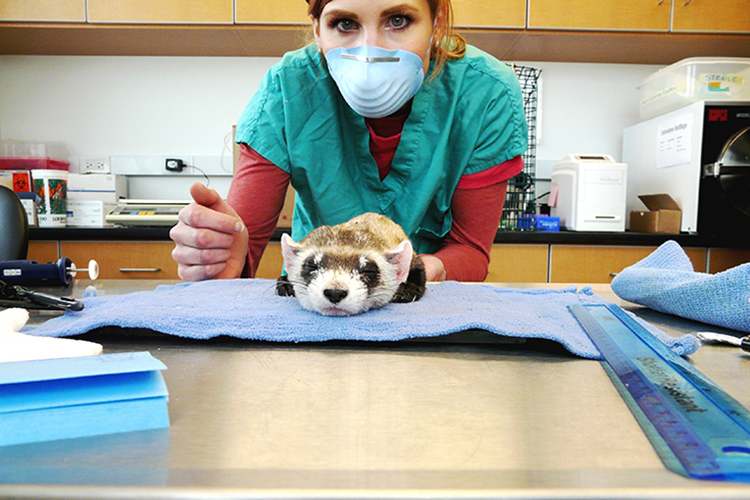 Rafacz collects data from a sedated ferret at the National Black-footed Ferret Conservation Center. Photo courtesy of Michelle Rafacz.
Rafacz collects data from a sedated ferret at the National Black-footed Ferret Conservation Center. Photo courtesy of Michelle Rafacz.Becoming a tenured professor is an immense honor for any academic. For eight Columbia faculty members, the rigorous six-year tenure process is recognized in their new rank as associate professor.
“The newly tenured faculty members are an extraordinary group,” says Senior Vice President and Provost Stan Wearden. “In my review of their dossiers, I saw remarkable records of scholarship, publication, and creative endeavors. I was pleased to see that we have faculty at Columbia who are truly shaping the future of their disciplines–faculty who are emerging as national leaders and innovators. Reviewing their dossiers made me proud, once again, to be part of this amazing professional community of scholars and makers.”
Kathleen Paciga, PhD
Associate Professor, Education
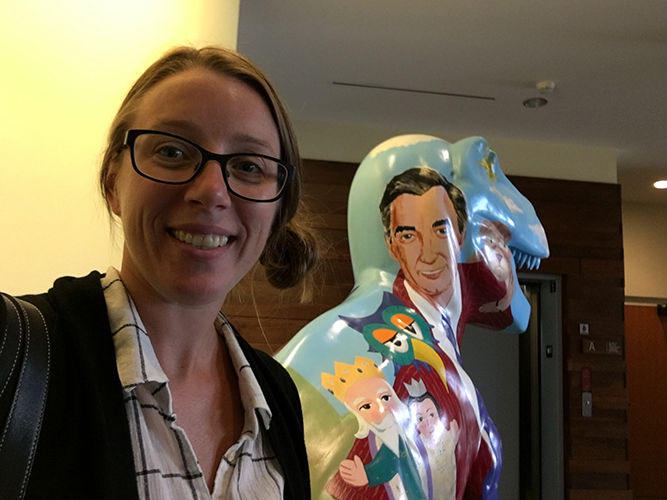 Paciga at the Fred Rogers Center for Early Learning and Children's Media at Saint Vincent College, which she calls “my most challenging endeavor, other than mothering my three children.” Photo courtesy of Kathleen Paciga.
Paciga at the Fred Rogers Center for Early Learning and Children's Media at Saint Vincent College, which she calls “my most challenging endeavor, other than mothering my three children.” Photo courtesy of Kathleen Paciga.
“I feel a sense of lightening [with receiving tenure] but I'm a teacher first. My journey with the profession started in kindergarten classrooms in Berwyn, Ill. So I feel like that part of my work is so ingrained in my day-to-day life that it won't change. I hope that I'll be able to find ways to navigate toward more interdisciplinary teaching with colleagues across Columbia—children's literature can serve as the foundation for many great artistic endeavors.
“I really want to start to engage in more creative practice. When I was younger I had aspirations to write and publish children's literature—printed or digital. I recently submitted a manuscript Stuart and the Sock Monster to an open call from a children's book publisher. In addition, I've started consulting with children's app developers to advise on the developmental appropriateness of the content they're developing. As a part of this, I'm also reviewing children's technology for Children's Technology Review. Once my business from my Early Career Research Fellowship lets up I hope to turn considerable amounts of attention to these new creative endeavors.”
Joseph Bogdan, JD
Associate Professor, Business and Entrepreneurship
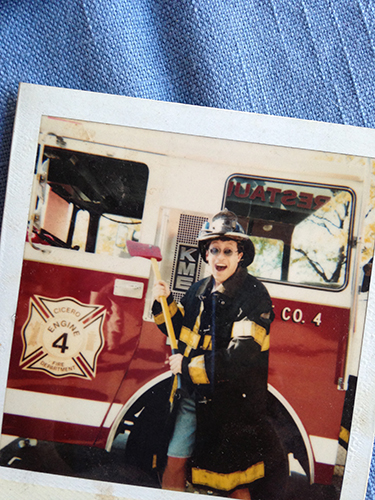 ""For me, teaching comes as a logical step in a career that has already involved much–big firm lawyer, entrepreneur, professional wrestler shaman, etc.” Photo courtesy of Joe Bogdan.
""For me, teaching comes as a logical step in a career that has already involved much–big firm lawyer, entrepreneur, professional wrestler shaman, etc.” Photo courtesy of Joe Bogdan.
“After six years, I want to thank the hundreds of students who have been in my classes, on my advisor roll and otherwise in contact with me here at Columbia over the years. I think about a lot of them, often—particularly the ones from the first couple of years, who surely have graduated by now and are out in the working world. When I was a college student I really didn’t think about the professors’ static role, teaching hordes of people just like me. Some of those professors probably don’t remember me, but I hope that some of them do, just as I remember lots and lots of our students. I want to give a shout out also to all those faculty and staff who advised and supported my quest for tenure.
“I have a few ideas about new ways to present material [in the classroom], but their implementation won’t be nearly as much a product of the fact that I have been awarded tenure as of the fact that I am continuing to evolve as an academic.
“I am currently winding down years of Board level participation in the creative community so that I can undertake some efforts to get back to volunteering at the grass roots level. I have recently begun scheduling the presentation of two business and entrepreneurship-related programs to the City of Chicago's Department of Business Affairs and Consumer Protection and members of the Evanston Chamber of Commerce. They are called How to Get Loans and Investments and Protecting Yourself with a Strategy for Intellectual Property, respectively."
Justin Sinkovich, MAM
Associate Professor, Business and Entrepreneurship
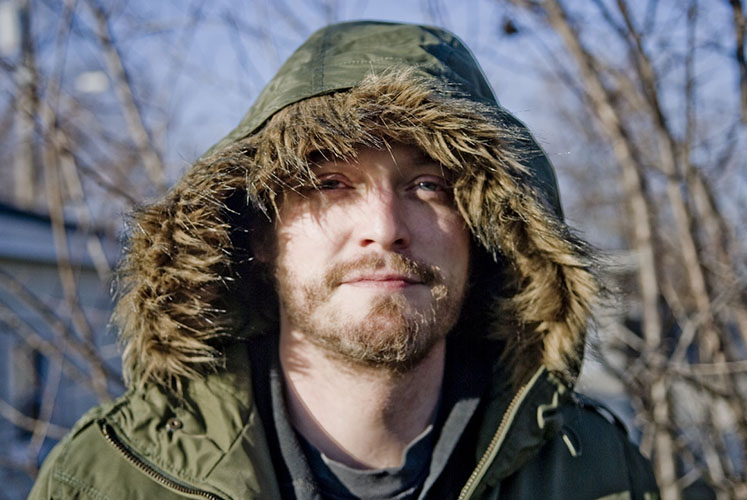 "I fell in love with teaching and then was lucky enough to be hired full time. I would have stayed in tech and music as my day job probably, but I am so happy to be here.” Photo courtesy of Justin Sinkovich.
"I fell in love with teaching and then was lucky enough to be hired full time. I would have stayed in tech and music as my day job probably, but I am so happy to be here.” Photo courtesy of Justin Sinkovich.
When Justin Sinkovich received the email about being awarded tenure he was at the South-by-Southwest Music Festival with bands he used to represent. Afterwards, he celebrated with Business and Entrepreneurship colleague and newly-tenured Joe Bogdan, along with Columbia colleagues and about 100 students who were there on an annual multi-class trip.
“Columbia is like my home, and the community is very much like my family. There are so many brilliant and passionate people on campus that I have had the honor to collaborate with and become friends with. I would just like to thank them and everyone who has contributed to such a wonderful place, most especially the students.
“It is always great to bring the experience of globally marketing music digitally and on physical formats, licensing the music to television and film, and coordinating tours into the classroom for our students who are pursuing similar opportunities.”
Sinkovich keeps busy with his record label File 13 and his band The Poison Arrows, in which he sings and plays guitar. The band’s third album No Known Note will be released on April 28.
Michelle Rafacz, PhD
Associate Professor, Science and Mathematics
 Rafacz collects data from a sedated ferret at the National Black-footed Ferret Conservation Center. Photo courtesy of Michelle Rafacz.
Rafacz collects data from a sedated ferret at the National Black-footed Ferret Conservation Center. Photo courtesy of Michelle Rafacz.
“Even if you don’t think you’re ‘good at science’—something I hear all the time from my students—don’t fear it, embrace it! The scientific community needs open, inventive, and creative minds, and in my personal experience, the most creative thinkers make the absolute best scientists. I also think that the Columbia community as a whole would benefit from seeing and understanding just how beautifully interconnected the arts and the sciences are—there are so many prospects for creative collaboration, and I think we all need to take advantage of those unique opportunities.
“I recently published a number of papers that resulted from research focused on the role of scent in stress physiology and reproductive behavior in African painted dogs and black rhinos. Currently, I’m working on a research project with my colleague at Lincoln Park Zoo investigating the role of female mate choice in reproductive success of the captive black-footed ferret population. A highly-endangered species, the black-footed ferret was brought back from the brink of extinction through a very intensive breeding and reintroduction program. We intend to investigate questions related to a recent decrease in success of the program likely caused by inbreeding depression. We plan to look at the role of male facial symmetry, testosterone, and morphology of other physical features in the behavior and partner choice of female ferrets in an effort to understand whether this may influence breeding success of the population.”
Madhurima Chakraborty, PhD
Associate Professor, English
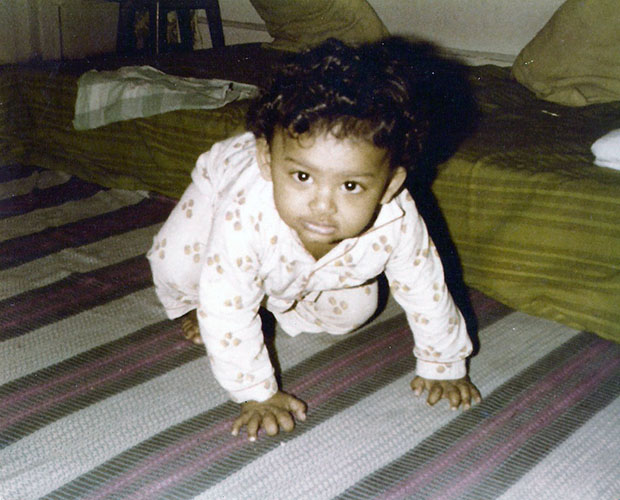 "I think this picture best captures how young I was when I started [teaching at Columbia],” jokes Chakraborty. Photo courtesy of Madhurima Chakraborty.
"I think this picture best captures how young I was when I started [teaching at Columbia],” jokes Chakraborty. Photo courtesy of Madhurima Chakraborty.
“I feel lucky to have been in a department and larger college community in which I was encouraged to teach what and how I wanted as long as it held up to rigorous standards; I hope and expect to continue working on new and exciting classes as well as refresh the course materials for what I already teach. The models I see in my department are of people who’ve not at all slowed down after tenure. Without selling the significance of tenure short, I hope to follow in their footsteps and continue the work I’ve been encouraged to do.”
In October 2016, Dr. Chakraborty co-edited Postcolonial Urban Outcasts: City Margins in South Asian Literature. She is also on the Executive Committee for the South Asian Literary Association.
Jackie Spinner, MS
Associate Professor, Communication
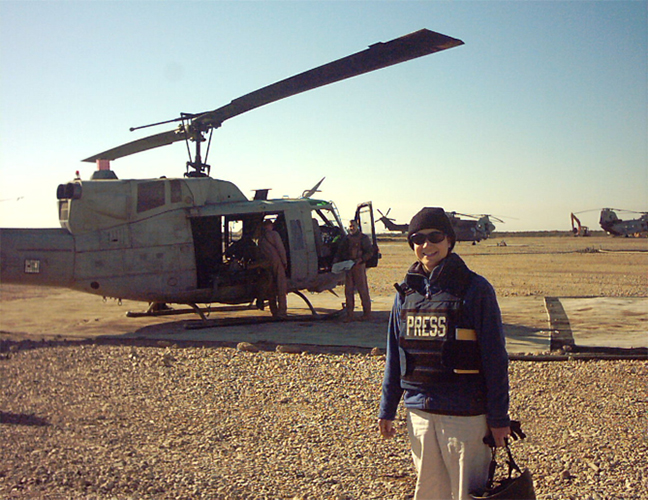 Spinner during the Triangle of Death occupation of Iraq, 2004. Photo courtesy of Jackie Spinner.
Spinner during the Triangle of Death occupation of Iraq, 2004. Photo courtesy of Jackie Spinner.
Teaching at Columbia has given Jackie Spinner the “opportunity to be a carpenter, to create, to build a bridge between the industry and the academy.” In 2015, Spinner led the effort to launch Columbia's Multimedia Photojournalism BA.
“I am a full-time correspondent for Columbia Journalism Review and will spend my sabbatical in Morocco creating a photo exhibit and series of mini-documentaries on children with autism and writing a book about autism. I am a member of the Casablanca Sister City Committee in Chicago and volunteer in the Iraqi refugee community.”
In 2006, Spinner released her memoir Tell Them I Didn’t Cry (Scribner) about her nine months as a war reporter in Iraq. Along with her 14 years at the Washington Post, Spinner has contributed to the Christian Science Monitor, Foreign Policy Magazine, Slate, Glamour and American Journalism Review. Spinner has reported from Afghanistan, Jordan, Oman, Ecuador, Hungary, Spain, Morocco, Finland, Iceland, Israel, Egypt, Palestine, and Kuwait.
Julie Minbiole, PhD
Associate Professor, Science and Mathematics
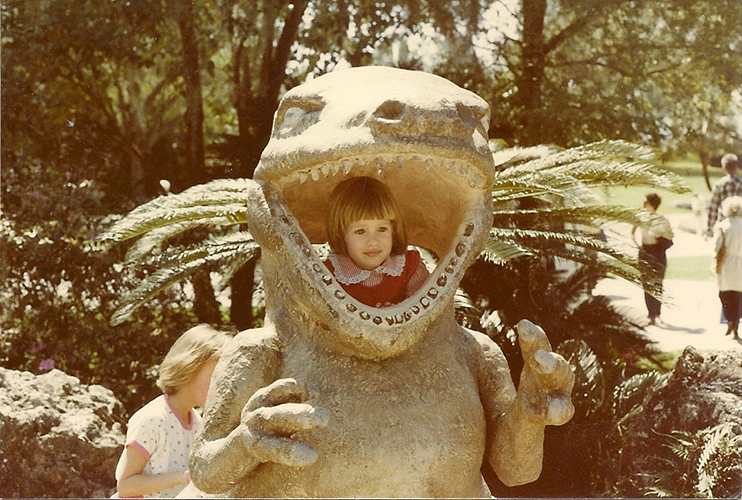 Julie Minbiole, age 3 at Busch Gardens in Tampa, Fla. “I picked this photo because I think it shows my love of science and when I was crazy about dinosaurs as a kid.” Photo courtesy of Julie Minbiole.
Julie Minbiole, age 3 at Busch Gardens in Tampa, Fla. “I picked this photo because I think it shows my love of science and when I was crazy about dinosaurs as a kid.” Photo courtesy of Julie Minbiole.
“Outside of Columbia I am enjoying spending time with my newly expanded family of three. My 5-week old daughter, Sloane, was the first person to hear the news of me becoming tenured, followed by a call to my husband to share the good news shortly after. I celebrated the news with dinner out at my favorite restaurant, Girl and the Goat, with my husband and some of our friends.
“Being a tenured faculty member at Columbia allows me to continue my passion of bringing science to a larger community. Science helps us explain and understand the world that we live in, so I want as many people as possible to feel ownership in scientific conversation. This is what drives my teaching but also my research in scientific literacy.
“I have loved all things science since I was little, but if I wasn’t a biology professor today, I would probably still be pursuing my first passion in college, which was photography.”
Minbiole’s publication history and research interests can be found at biologyprof.com.
Taylor Hokanson, MFA
Associate Professor, Art and Art History
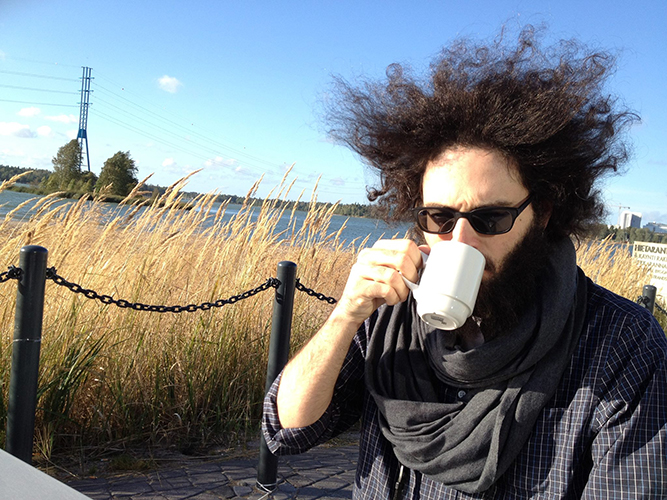 Hokanson in Finland. Photo courtesy of Taylor Hokanson.
Hokanson in Finland. Photo courtesy of Taylor Hokanson.
“My creative practice varies widely: right now I'm starting a podcast with a collaborator in Los Angeles, 3D printing custom silver flatware, and recording software tutorials for the LinkedIn Learning Library. All of these pursuits involve the creative application of technology, and the process of applying for tenure helped me articulate this theme to both my peers around the college and in the field at large. Being granted the rank of associate professor is immensely rewarding, and gives me the confidence to keep developing artwork that doesn't take the form of a traditional sculpture or painting.”
More information about Hokanson’s projects are also available on his website.